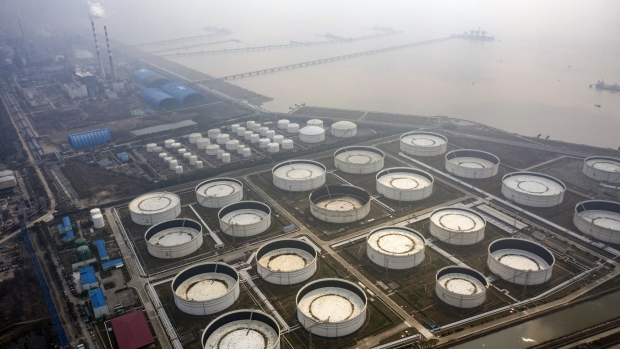Oct 13, 2022
China Oil Demand in Limbo as Virus Saps Travel Before Party Congress
, Bloomberg News

(Bloomberg) -- China’s appetite for overseas oil is yet to make a meaningful recovery as anxiety over virus lockdowns keeps travel subdued, overshadowing an increase in fuel export quotas aimed at supporting economic growth.
Journeys by plane over Golden Week in the first week of October were down 42% from a year earlier, according to China Aviation Daily. Road trips by Chinese tourists were about 30% lower over the holidays than in 2021, the Ministry of Transport said.
Transport accounts for about half of oil consumption in China, the world’s biggest importer of crude, so the lack of activity is exerting downward pressure on global prices. And while there had been some speculation Beijing might soon start to relax its Covid Zero policy, the chance of that now appears increasingly remote, at least in the short term.
Instead, a fresh resurgence of the virus is leading to more restrictions in the run-up to the Communist Party congress at which President Xi Jinping is expected to secure a third five-year term. Shanghai has been shutting down some school classes and entertainment venues ahead of the twice-in-a-decade meeting that starts on Sunday, stoking fears of a full lockdown.
See also: China’s Covid Zero Keeps Oil Demand in Check as Travel Wanes
The growing pessimism over energy demand has damped expectations that fresh fuel export quotas granted to Chinese refiners would lead to a jump in crude imports. Spot market purchases have been subdued so far this month, with no major uptick in activity from either state-owned or private processors, according to traders participating in the market.
“As China will likely maintain its tough stance on Covid for the remainder of 2022, and as winter is the peak season for viral spread, we see some downside risk to our forecast,” Energy Aspects analysts including London-based Jianan Sun said in a note this week. The industry consultant had estimated that Chinese demand may grow by 880,000 barrels a day this quarter from the previous three months.
Chinese refiners will likely only raise production to around half the increase achievable if they used all their export quotas, according to the EA note. Weak domestic consumption and also uncertainty on global demand is making them cautious, it said.
The most-active spot trading period for December-loading crude cargoes is set to begin in the coming days. There’s a chance there could be an increase in demand from two new mega-refineries -- run by Shenghong Group and PetroChina Co. -- as they ramp up before starting operations later this year.
It’s also possible that fuel demand could rebound if authorities decide to prioritize economic growth following the congress. Chinese gasoline consumption may grow 7% this quarter from the same period in 2019, said Yuwei Pei, a consultant at Wood Mackenzie Ltd. That compares with a 2% increase over 2019 in the three months through September, she said.
(Updates with Energy Aspects note in 6th paragraph.)
©2022 Bloomberg L.P.






